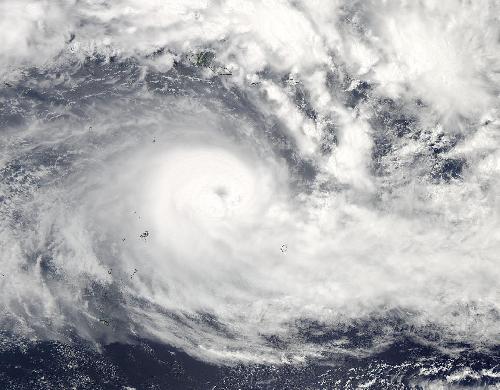NASA's Aqua satellite provided a visible picture of Tropical Cyclone Winston as it continued to intensify over the Southern Pacific Ocean and affect Tonga.
On Feb. 17 at 01:00 UTC (Feb. 16 at 8 p.m. EST) the Moderate Resolution Imaging Spectroradiometer aboard NASA's Aqua satellite captured a visible image of Tropical Cyclone Winston that showed an eye surrounded by powerful thunderstorms.
A gale and heavy swell warning is in effect for Niue. Niue is a large upraised coral atoll island located east of Tonga. Niue is one of the smallest countries that has one of the largest raised coral atolls on Earth.
 On Feb 17 at 01:00 UTC NASA's Aqua satellite captured this visible image of powerful Tropical Cyclone Winston in the South Pacific Ocean. Credit: Credits: NASA Goddard MODIS Rapid Response/Jeff Schmaltz
On Feb 17 at 01:00 UTC NASA's Aqua satellite captured this visible image of powerful Tropical Cyclone Winston in the South Pacific Ocean. Credit: Credits: NASA Goddard MODIS Rapid Response/Jeff Schmaltz
In Tonga a gale warning is in effect for waters east and northeast of Vava'u. Tonga is a Polynesian kingdom that consists of 176 islands, 40 of which are inhabited. It is a big vacation destination with beaches, coral reefs and tropical rainforests. Tonga is made up of four major island groups: Tongatapu and 'Eua in the south, Ha'apai group in the center and Vava'u group in the north.
At 1500 UTC (10 a.m. EST) Winston's maximum sustained winds were near 90 knots (103.7 mph/166.7 kph). The hurricane-force winds are very concentrated and extend out 30 nautical miles from the center. However, the tropical storm force winds extend 120 nautical miles (138.1 miles/222.2 km) out from the center.
It was located near 17.5 degrees south latitude and 171.0 degrees west longitude. That's about 115 nautical miles (132.3 miles/213 km) north-northwest of Niue. Winston is moving very slowly to the east at 2 knots (2.3 mph/3.7 kph).
For updated forecasts from the Tonga Meteorological & Coast Radio Services, visit: http://www.met.gov.to/. For forecasts from the Fiji Meteorological Services, visit: http://www.met.gov.fj. For updated forecasts Niue, visit the Fiji Meteorological Service at: http://www.met.gov.fj/niue.php.
The Joint Typhoon Warning Center (JTWC) said that Winston is becoming quasi-stationary and will continue to strengthen, peaking near 115 knots south of American Samoa. The extended JTWC forecast calls for Winston to turn to the west and head north of Tonga over the next couple of days.
source: NASA/Goddard Space Flight Center